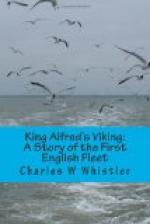It is a great square-sided patch of rolling, forest-covered country, maybe twelve miles long from north to south, and half as much across. None can enter it from the north, because there is the sea, and a wild coast that is not safe for a landing; on the west the great, steep, fort-crested Quantock Hills keep the border; on the eastern side is the river Parret, and on the north the Tone, which joins it. Except at Bridgwater, at the eastern inland corner, and Taunton, at the western—one at the head of the tidal waters of the Parret, and the other guarding the place where the Quantocks end—there is no crossing the great and wide-stretching fens of Sedgemoor and Stanmoor and the rest that lie on either bank of the rivers. Paths there are that the fenmen know, winding through mere and peat bog and swamp, but no host can win through them; and perhaps those marches are safer borders than even the sea.
If one came from the sea, one must land at Watchet, and then win a path across the Quantocks, and there is the ancient camp of Dowsborough to block the way; or else put into the Parret, and there, at the first landing place, where they say that Joseph of Arimathaea landed, bearing the holy thorn staff in his hand, is the strong hill fort of Combwich, old as the days of that Joseph, or maybe older.
So with walled towns and hill forts the corners of Heregar’s land were kept; and with sea and marsh and hill the sides were strong, and we thought to find Alfred the king here before us. But he was not; and next day we rode on to Taunton to seek him there, for that was the strongest fortress in that part of the west. And again he was not to be heard of. Then fear for his life began to creep into our minds, and we came back to Cannington sorely downcast.
Then Heregar spoke to me very kindly of what he thought I could best do, and it was nothing more or less than that I should leave this land, which seemed to have no hope of honour for me now.
“Go rather to Rolf, your countryman,” he said. “There is great talk of his doings in Neustria {xii} beyond the Channel. It is your kindness only that holds you here, King Ranald, and there wait glory and wealth for you and your men.”
So he urged me for a little while, not giving me time to answer him as I would; but when I said nothing he stayed his words, and then I spoke plainly, and it was good to see his face light up as I did so.
“It shall not be said of me that I left King Alfred, who has been my good friend, in time of trouble; rather will I stay here and do what I can to help him out of it. Why, there are ships that I have put in frame for him in the western ports that the Danes will not reach yet, if at all. When spring comes we will man them and make a landing somewhere, and so divide the Danish host at least.”
“Now I will say no more,” answered the thane, putting his hand on mine. “Speak thus to the king when we find him, and it will do him good, for I think that when he left Chippenham he was well-nigh despairing.”




